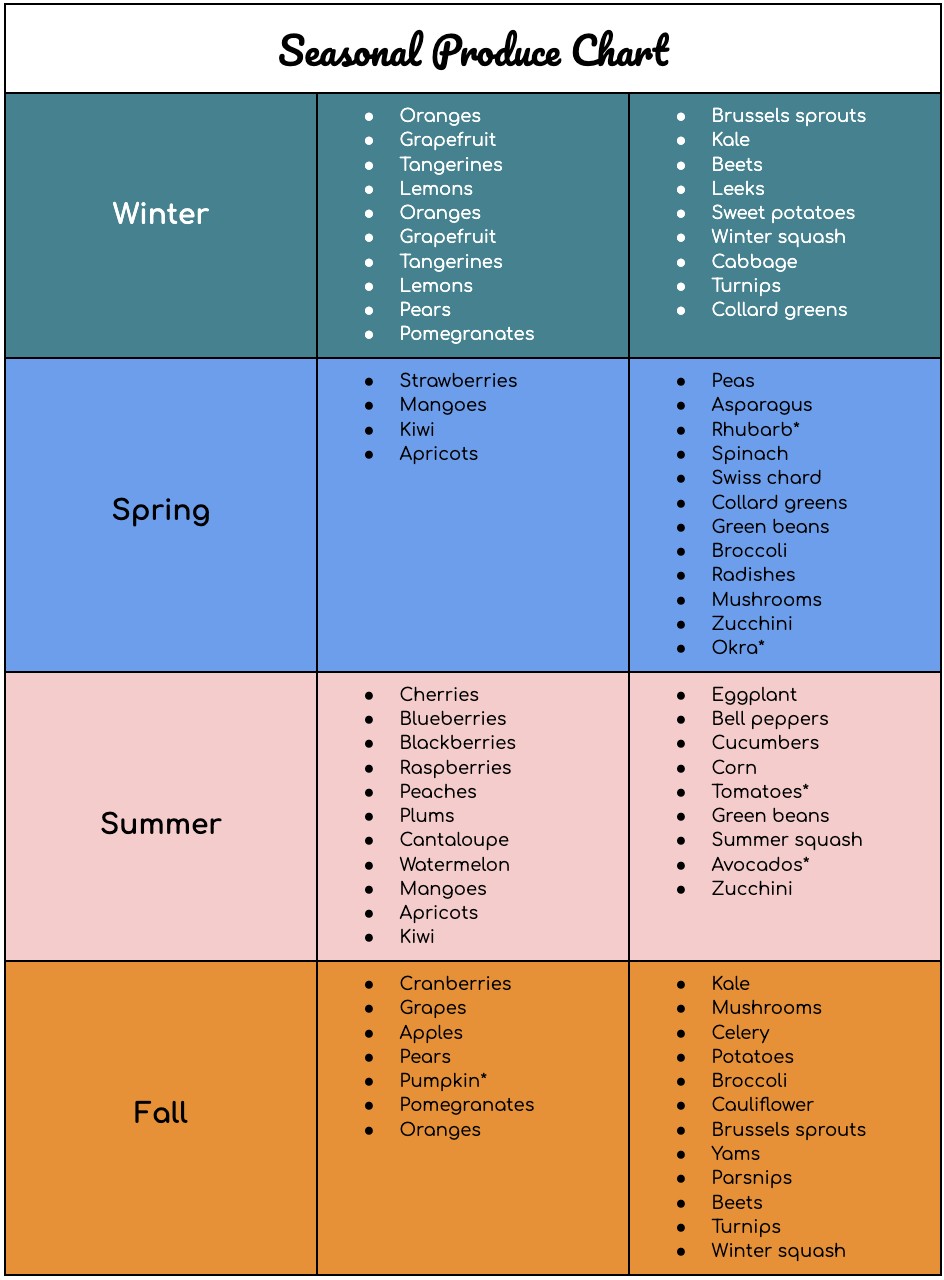Eating fruits and vegetables that are in season is not just a trend; it’s a smart choice for your health, your taste buds, and your wallet. Produce at its peak seasonal ripeness offers the best flavor and nutritional value. Plus, buying seasonal and local often supports sustainable practices and can be more budget-friendly than opting for out-of-season imports.
If you’re looking to make more informed choices about your produce, understanding what fruits and vegetables are in season each month is key. This guide provides a comprehensive monthly breakdown to help you navigate your next grocery shopping trip or farmers market visit. Keep in mind that seasonal availability can slightly vary depending on your specific region and climate.
Monthly Guide to Seasonal Fruits and Vegetables
Here’s a detailed look at the fruits and vegetables that are typically in season each month:
January
January is the time for robust, winter-hardy produce. You’ll find cruciferous vegetables like Brussels sprouts and kale thriving, alongside root vegetables such as beets, leeks, sweet potatoes, and various types of winter squash including acorn, spaghetti, and butternut. For a refreshing touch of fruit, citrus varieties like oranges, grapefruit, tangerines, and lemons are at their best.
Fruits
- Oranges
- Grapefruit
- Tangerines
- Lemons
Vegetables
- Brussels sprouts
- Kale
- Beets
- Leeks
- Sweet potatoes
- Winter squash
February
February continues to offer much of the same fresh produce as January. You can still enjoy the winter vegetables and citrus fruits from the previous month, along with the addition of cabbage and turnips.
Fruits
- Oranges
- Grapefruit
- Tangerines
- Lemons
Vegetables
- Cabbage
- Turnips
- Brussels sprouts
- Kale
- Beets
- Leeks
- Sweet potatoes
- Winter squash
March
As March brings milder weather in many areas, a wider variety of greens start to become available. Look for fresh greens such as spinach, Swiss chard, and collard greens. Other vegetables coming into season include green beans, broccoli, radishes, and mushrooms. For fruits, strawberries, mangoes, and kiwi fruit begin to appear.
Fruits
- Strawberries
- Mangoes
- Kiwi
Vegetables
- Spinach
- Swiss chard
- Collard greens
- Green beans
- Broccoli
- Radishes
- Mushrooms
April
April expands on the produce available in March, with peas, asparagus, and rhubarb joining the seasonal selection as the weather continues to warm up.
Fruits
- Strawberries
- Mangoes
- Kiwi
Vegetables
- Peas
- Asparagus
- Rhubarb*
- Spinach
- Swiss chard
- Collard greens
- Green beans
- Broccoli
- Radishes
- Mushrooms
May
May sees the continuation of spring produce from April, but also welcomes the first hints of summer fruits and vegetables. Apricots, strawberries, zucchini, and okra begin to make their appearance.
Fruits
- Apricots
- Strawberries
- Mangoes
- Kiwi
Vegetables
- Zucchini
- Okra*
- Peas
- Asparagus
- Rhubarb*
- Spinach
- Swiss chard
- Collard greens
- Green beans
- Broccoli
- Radishes
- Mushrooms
June
June is when the vibrant flavors of summer really start to shine. Juicy summer fruits like cherries, blueberries, blackberries, raspberries, peaches, plums, cantaloupe, and watermelon become readily available. You’ll also find vegetables like avocados, bell peppers, cucumbers, corn, and tomatoes at their freshest. Farmers’ markets are particularly abundant during this month.
Fruits
- Cherries
- Blueberries
- Blackberries
- Raspberries
- Peaches
- Plums
- Cantaloupe
- Watermelon
Vegetables
- Avocados*
- Bell peppers
- Cucumbers
- Corn
- Tomatoes*
July
July offers a continuation of June’s bounty. It’s the perfect month for grilling and enjoying summer cookouts with fresh, seasonal vegetables like corn, tomatoes, zucchini, and bell peppers.
Fruits
- Cherries
- Blueberries
- Blackberries
- Raspberries
- Peaches
- Plums
- Cantaloupe
- Watermelon
Vegetables
- Avocados*
- Bell peppers
- Cucumbers
- Corn
- Tomatoes*
- Zucchini
August
As summer reaches its peak in August, you can continue to enjoy summer favorites. Eggplant, tomatoes, corn, cucumbers, bell peppers, green beans, and summer squash remain in season, alongside fruits like melons, berries, peaches, apricots, mangoes, and kiwis.
Fruits
- Berries
- Peaches
- Melons
- Mangoes
- Apricots
- Kiwi
Vegetables
- Eggplant
- Bell peppers
- Cucumbers
- Corn
- Tomatoes*
- Green beans
- Summer squash
September
September marks the transition from summer to fall, bringing with it a new array of seasonal produce. Fresh fruits like grapes, cranberries, pomegranates, pears, pumpkin, and apples become available. For vegetables, look for potatoes, yams, winter squash, mushrooms, kale, broccoli, beets, turnips, parsnips, and cauliflower.
Fruits
- Cranberries
- Grapes
- Apples
- Pears
- Pumpkin*
- Pomegranates
Vegetables
- Kale
- Mushrooms
- Potatoes
- Broccoli
- Cauliflower
- Yams
- Parsnips
- Beets
- Turnips
- Winter squash
October
October continues to offer much of the fresh produce from September, with celery and Brussels sprouts adding to the mix.
Fruits
- Grapes
- Cranberries
- Apples
- Pears
- Pomegranates
Vegetables
- Kale
- Mushrooms
- Celery
- Potatoes
- Broccoli
- Cauliflower
- Brussels sprouts
- Yams
- Parsnips
- Beets
- Turnips
- Winter squash
November
November brings a similar selection of fall produce as October, with pumpkins and oranges re-emerging as seasonal favorites.
Fruits
- Grapes
- Cranberries
- Apples
- Pears
- Pomegranates
- Pumpkins*
- Oranges
Vegetables
- Kale
- Mushrooms
- Celery
- Potatoes
- Broccoli
- Cauliflower
- Brussels sprouts
- Yams
- Parsnips
- Beets
- Turnips
- Winter squash
December
December, despite the cold, still offers a selection of fresh, seasonal produce. Collard greens, kale, turnips, sweet potatoes, pomegranates, and pears are in season, along with other produce carried over from November and January.
Fruits
- Pears
- Pomegranates
Vegetables
- Kale
- Collard greens
- Turnips
- Sweet potatoes
Seasonal Produce Chart: Fruits and Vegetables In Season
For a quick visual guide to seasonal produce, refer to this helpful chart:
 Seasonal Produce Chart: A helpful guide to fruits and vegetables in season each month, making healthy eating and local shopping easier.
Seasonal Produce Chart: A helpful guide to fruits and vegetables in season each month, making healthy eating and local shopping easier.
* Foods marked with an asterisk are botanically classified differently from how they are commonly used in culinary contexts (e.g., tomatoes are technically fruits, but often used as vegetables).
By using this guide, you can easily determine What Fruits Are In Season Now and make the most of seasonal eating throughout the year. Enjoy the freshest flavors and nutritional benefits that each season has to offer!
